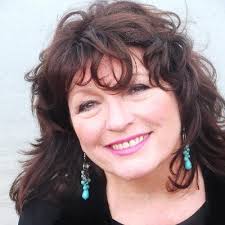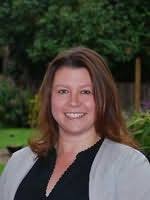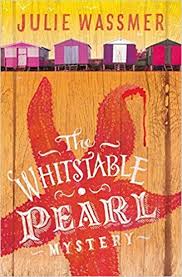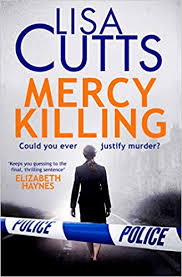There was a series of horrendous murders in the Beaney last night. Not, thankfully, in real life, but in the minds and the words of crime writers Lisa Cutts and Julie Wassmer, in a wide-ranging and fascinating panel discussion entitled Murder Most Female. Women in crime fiction – both as characters and as authors – is a topic currently en vogue in the lead up to the Staunch Book Prize, launched back in January and for which the inaugural prize in November “will be awarded to the author of a novel in the thriller genre in which no woman is beaten, stalked, sexually exploited, raped or murdered.” Created in response to what Cutts recognised last night as the progressive darkening in tone of the genre, the prize has caused some controversy in its desire to combat what it sees as ‘an overload of violence towards women in modern fiction.’

Cutts and Wassmer write in contrasting styles; the former in the Police Procedurals genre, the latter in what has been called ‘Cosy Crime,’ a sub-genre which avoids graphic violent or sexual content; interestingly, last night both writers declared that they had not set out specifically to write in these styles, it was only after publication that they each found they had been labelled as such, in order to position their novels in the huge sea of fiction for the ease both of marketing departments and readers alike. Cutts, who also works as a full-time police detective, observed that “it is men who are more likely to meet a violent end,” and that the progressively darker tone of recent crime fiction will appeal to some but not all readers. Wassmer replied by that perhaps this reflects readers exploring more gruesome aspects of society from the security of their own home: “they feel safe reading about horrendous crimes sat in bed with a cup of hot cocoa!”

As for the labels under which each writer works, Wassmer revealed that she had to look up precisely what ‘Cosy Crime’ meant after seeing it applied to her books on Amazon, but in fact it challenges her to push her writing beyond the bounds such a label imposes. In contrast, Cutts is comfortable working within hers – for now, at least – as it is useful for marketing and helping readers, but not necessarily a priority for writers themselves.
 Both women stressed the importance of research to their writing. Cutts attended an autopsy in order to inform part of one of her novels; she came away, she says, awed by the amount of work and commitment which goes in to them. “They’re not as clean and quick as they are on TV; they take hours!” she declared, whilst ruefully admitting to having worn the ‘wrong sort of shoes’ as she hadn’t anticipated standing for so long. For her Whitstable-based series featuring private detective-cum–restaurant-owner, Pearl Nolan, Wassmer spent last summer exploring locations including Reculver, Sheppey and Oare in order to widen the scope of her character’s travels. “Details are important,” Wassmer stated: “you don’t want a sackful of mail criticising a point in your book!” Although she balanced this by admitting that, for her, it is important to remember that, after all, it is the writer’s own world, one that they have created, and that on one level they can do what they like. Wassmer has had reviews where readers take issue with the geography of Whitstable as it appears in her books, with particular roads not leading to exactly the right road. Cutts says she often ends up shouting at television programmes; “No, no, no; you didn’t caution him!” before adding reflectively “it’s why I don’t really watch much crime drama on TV…”
Both women stressed the importance of research to their writing. Cutts attended an autopsy in order to inform part of one of her novels; she came away, she says, awed by the amount of work and commitment which goes in to them. “They’re not as clean and quick as they are on TV; they take hours!” she declared, whilst ruefully admitting to having worn the ‘wrong sort of shoes’ as she hadn’t anticipated standing for so long. For her Whitstable-based series featuring private detective-cum–restaurant-owner, Pearl Nolan, Wassmer spent last summer exploring locations including Reculver, Sheppey and Oare in order to widen the scope of her character’s travels. “Details are important,” Wassmer stated: “you don’t want a sackful of mail criticising a point in your book!” Although she balanced this by admitting that, for her, it is important to remember that, after all, it is the writer’s own world, one that they have created, and that on one level they can do what they like. Wassmer has had reviews where readers take issue with the geography of Whitstable as it appears in her books, with particular roads not leading to exactly the right road. Cutts says she often ends up shouting at television programmes; “No, no, no; you didn’t caution him!” before adding reflectively “it’s why I don’t really watch much crime drama on TV…”

Both writers also emphasised the hard graft required in writing, the need for self-discipline in order to see a work through to its conclusion. Cutts sits at the laptop each day, even when not enthused about the prospect. “Sometimes it feels like housework, and nobody wants to do housework!” Wassmer in turn referred to her experience writing for television’s Eastenders for twenty years, which has stood her in good stead in its relentless expectation that she would deliver to a regular deadline.
The work of both writers is unified by the idea of familiarity; “We both write what we know” Wassmer observed incisively, with her work projecting a strong love for the community of Whitstable, where she has lived for twenty years, and Cutts’ series starring Nina Foster informed by her work as a real-life detective, drawing on her experiences investigating murder and the protocols that are a part of the investigative process. Cutts made it clear, though, that her books do not simply draw on genuine cases, transplanting them into her work with the odd change of name and geographical details – “Not only would it be incredibly disrespectful,” she acknowledged, “it would also drag families through something horrendous that happened in their lives. And that’s what people perhaps don’t realise – the far-reaching effects on people and families that murder has.”
As the event drew to a close, what was clear was the passion, enthusiasm and the dedication both writers have for writing crime fiction, underpinned by the sheer hard graft of getting the words down on the page. There was a clear friendship between them – both live and work in the local area – which was extended to embrace a fascinated audience, and both were happy to chat afterwards about their work.
Crime writing aficionados can catch both women in action again at Murderous Medway, part of the Rochester Literary Festival, with panel discussions and writing workshops on the weekends of the 6th and 13th of October.
